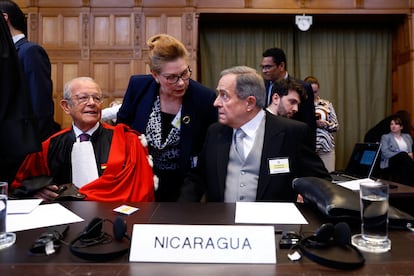The worst version of Nicaragua against the best version of Germany
The third international court case on the Gaza war pits a regime accused of crimes against humanity against a strong and legitimate democracy

It may be a noble cause, but its champion couldn’t be worse. The Nicaraguan dictatorship, recently censured by the United Nations for severe human rights abuses akin to crimes against humanity, has criticized Germany for arming Israel, and especially for elevating Israel’s security and right to exist to a “matter of state,” as defined by former German Chancellor Angela Merkel in her historic 2008 address to the Knesset (Israeli Parliament).
Nicaragua and Germany signed the 1948 Genocide Convention, which commits both nations to preventing and punishing genocide, as well as arbitration by the United Nations International Court of Justice (ICJ). Much like an earlier ICJ case brought by South Africa against Israel, Nicaragua is accusing Germany of facilitating breaches of the Genocide Convention by providing arms and other support to Israel. Nicaragua wants Berlin to stop weapon supplies and prevent weapons already given from being used in Gaza, and resume financing UNRWA, the U.N. relief agency in Gaza that has been accused of infiltration by Hamas.
Nicaragua filed the case against Germany because it was unable to do so against the United States, a long-time adversary of the Sandinista regime. Forty years ago, Nicaragua filed an ICJ case against the U.S. over its support of guerrillas fighting the Sandinista regime. Washington is a key weapons supplier to Israel and a signatory of the Convention. However, the U.S. took 40 years to ratify it, and only after significant amendments that gave the U.S. power of approval over any charges against the nation. Samantha Power, the current chief of the U.S. Agency for International Development (USAID) and former ambassador to the U.N., once likened this scenario to granting an accused murderer the authority to approve any charges brought against him.
This is the third case brought to the ICJ during the Gaza war. The first one, initiated by South Africa, resulted in two warnings for Israel to ensure humanitarian aid and civilian security. The second case, focusing on the consequences of the occupation, highlighted international support for the Palestinian State. The ICJ is not expected to quickly rule on the genocide case, but it adds to increasing U.N. and global pressure on Netanyahu for a lasting ceasefire.
Germany today is at its finest, driven by its sense of responsibility stemming from a tragic history. It stands as a staunch advocate for multilateralism and the international rule of law. Germany’s defense against Nicaragua’s charges is solid and its legitimacy as a democratic state is unassailable. Unlike the United States, it fully acknowledges the ICJ’s jurisdiction and the binding nature of its rulings. And all it needs to reverse the increasing polarization between the global south and the liberal West is full recognition of the Palestinian State’s right to exist.
Sign up for our weekly newsletter to get more English-language news coverage from EL PAÍS USA Edition
Tu suscripción se está usando en otro dispositivo
¿Quieres añadir otro usuario a tu suscripción?
Si continúas leyendo en este dispositivo, no se podrá leer en el otro.
FlechaTu suscripción se está usando en otro dispositivo y solo puedes acceder a EL PAÍS desde un dispositivo a la vez.
Si quieres compartir tu cuenta, cambia tu suscripción a la modalidad Premium, así podrás añadir otro usuario. Cada uno accederá con su propia cuenta de email, lo que os permitirá personalizar vuestra experiencia en EL PAÍS.
¿Tienes una suscripción de empresa? Accede aquí para contratar más cuentas.
En el caso de no saber quién está usando tu cuenta, te recomendamos cambiar tu contraseña aquí.
Si decides continuar compartiendo tu cuenta, este mensaje se mostrará en tu dispositivo y en el de la otra persona que está usando tu cuenta de forma indefinida, afectando a tu experiencia de lectura. Puedes consultar aquí los términos y condiciones de la suscripción digital.









































